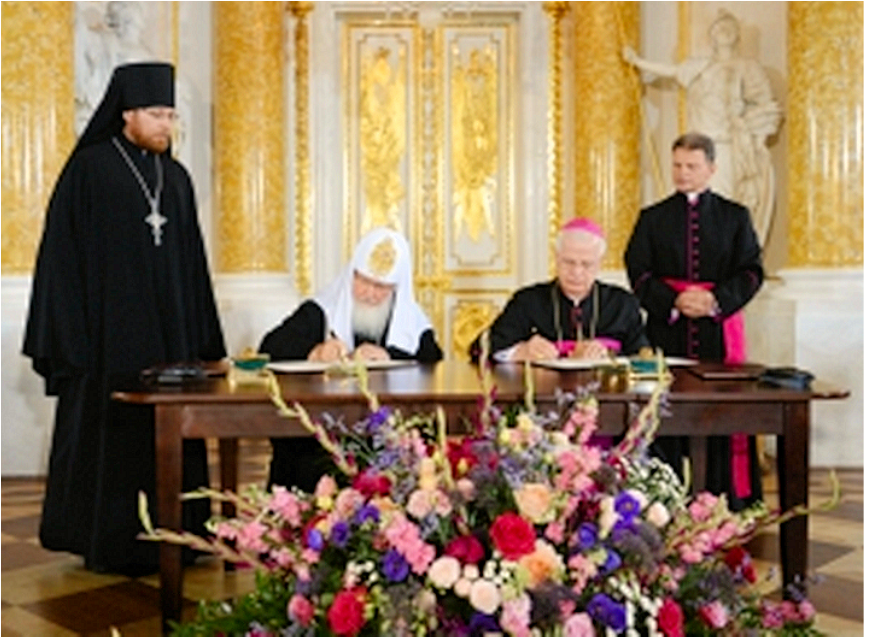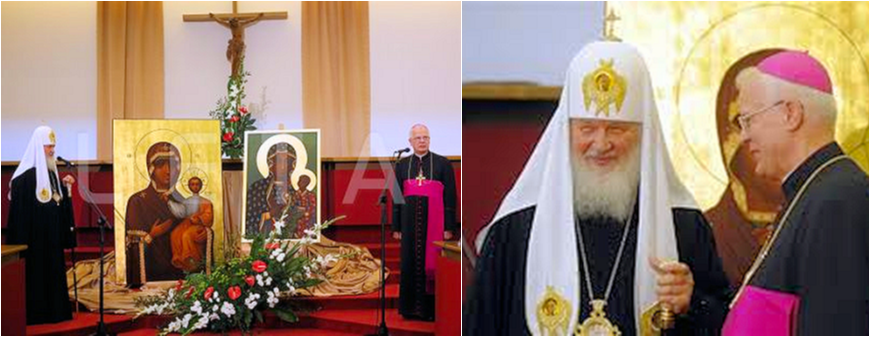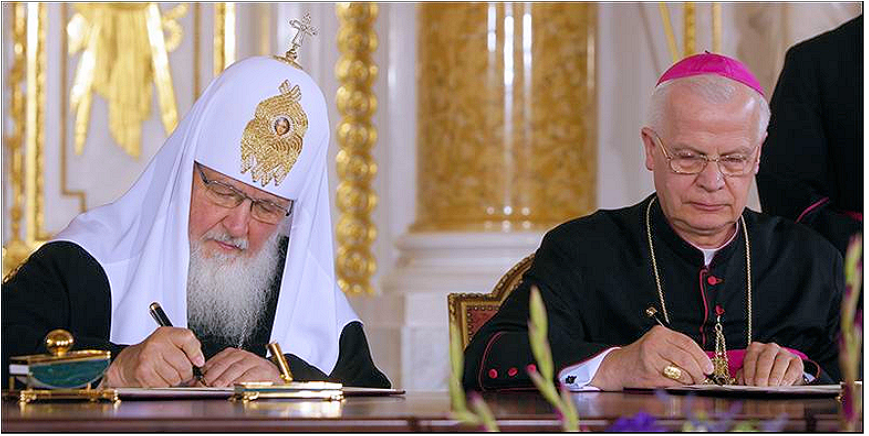 I apologize for having missed out on the historic joint declaration made two days ago in Warsaw by the Patriarch of Moscow and the chairman of the Polish bishops' conference calling on their peoples to end their centuries-long mutual hostility. Pope Benedict, of course, referred to it in today's Angelus messzages (see above).
Russian Orthodox and Polish Catholic
I apologize for having missed out on the historic joint declaration made two days ago in Warsaw by the Patriarch of Moscow and the chairman of the Polish bishops' conference calling on their peoples to end their centuries-long mutual hostility. Pope Benedict, of course, referred to it in today's Angelus messzages (see above).
Russian Orthodox and Polish Catholic
churches appeal for mutual forgiveness
By MONIKA SCISLOWSKA



WARSAW, Poland, August 17 (AP) — The leaders of Russia's Orthodox church and Poland's Catholic church signed a document Friday that urges their nations to forgive each other for past wrongs.
The signing in Warsaw during the first visit to Poland by a Russian Patriarch has been described by the churches as a historic act of reconciliation and the establishment of a bridge between the denominations. The two nations have feuded for centuries and their ties are still marked by distrust.
"We appeal to our believers to ask for the forgiveness of wrongs, injustice and every evil committed against each other," the document said. "We are certain that this is the first and the most important step toward rebuilding mutual trust, which is a necessary element of a lasting community and full reconciliation between people."
The document was signed during a ceremony at Warsaw's Royal Castle by Russian Orthodox Patriarch Kirill and Archbishop Jozef Michalik, the Polish church's highest-ranking leader.
Shortly after the ceremony, a Russian judge convicted three members of the punk band Pussy Riot of hooliganism driven by religious hatred and sentenced them to two-year prison terms for a performance in Moscow's main cathedral that called for the Virgin Mary to protect Russia against Vladimir Putin.
During the trial, the band members apologized to all Orthodox believers, saying that they did not mean to offend anyone and that their performance was aimed against Putin and Kirill, who had urged Russians to vote for Putin.
But Kirill, who took Putin's side in the case, has not commented on the Russian court case or the verdict since arriving in Warsaw on Thursday.
The document that Michalik and Kirill signed mentions the "open enmity, even fighting between our nations" in the past and calls for a "brotherly dialogue" in all walks of life. Church leaders said it is not another political declaration, but a religion-motivated call to the hearts and minds of ordinary people in both nations.
Kirill stressed that serving Christian religion obliged church leaders to promote the reconciliation.
Some have compared the document to a historic 1965 letter by Poland's bishops to the Catholic church leaders in Germany, offering and asking forgiveness for past wrongs between Poles and Germans, the most painful committed during World War II.
Today, Poland and Germany are enjoying friendly relations and are cooperating within the European Union.
The many sources of bitterness between Poles and Russians include Polish resentment over Moscow's control of Poland during the communist era and Russia's reaction to seeing Poland reject its influence and join Western institutions like NATO.
Elderly Poles still talk bitterly about Moscow's "stab in the back" — the attack from the East by the Soviet Red Army on Sept. 17, 1939, which came less than three weeks after German troops invaded Poland from the West, starting World War II. They point to the murders of more than 20,000 of their officers by Soviet secret police in 1940 in the Katyn forest and other sites.
More recently, conspiracy theories have smoldered since Polish President Lech Kaczynski and 95 other people were killed in a 2010 plane crash in Russia. Some Poles have accused Russians of not fully cooperating in investigating the crash.
Relations between the Orthodox church and the Catholic church also have been tense.
The Orthodox Church prevented Polish-born Pope John Paul II from making a trip to Russia. The Orthodox also have accused the Vatican of seeking Catholic converts in traditionally Orthodox areas — a charge Rome denies.
Poland's official in charge of discussing the sticking points with Russia, Adam Daniel Rotfeld, said the document signed Friday also laid foundations for an improvement in relations between the two churches in general.
Following is the Engish translation of the joint declaration:
JOINT MESSAGE
TO THE NATIONS OF POLAND AND RUSSIA
of the Chairman of the Bishops’ Conference of Poland
Archbishop Józef Michalik, Metropolitan of Przemyśl,
and
Kyrill, the Head of the Russian Orthodox Church,
Patriarch of Moscow and All Russia
 God was in Christ reconciling the world to himself, not holding anyone’s faults against them, but entrusting to us the message of reconciliation (2 Cor 5: 19)
God was in Christ reconciling the world to himself, not holding anyone’s faults against them, but entrusting to us the message of reconciliation (2 Cor 5: 19)
In the spirit of responsibility for the present and the future of our Churches and peoples, urged by pastoral concern, on behalf of the Catholic Church in Poland and of the Russian Orthodox Church we address this message of reconciliation to the faithful of our Churches, to our nations and all people of good will.
Proclaiming the truth that Jesus Christ is our peace and reconciliation (cf. Eph 2: 14; Rom 5:11), aware of the call entrusted to us in the spirit of Christ’s Gospel, we wish to make our contribution to the work of rapprochement between our Churches and reconciliation between our nations.
1. Dialogue and reconciliation
Our brotherly nations have been tied not only by long centuries of neighbourhood, but also by the extensive Christian legacy of East and West. Aware of this long and shared history and the tradition, which takes its roots in the Gospel of Christ and has exerted a decisive impact on the identity, spirituality and culture of our peoples and of the entire Europe, we enter a path of honest dialogue in the hope that it will heal the wounds of the past, facilitate our overcoming mutual prejudice and misunderstanding and strengthen us in our pursuit of reconciliation.
Sin, which is the principal source of all divisions, human frailty, individual and collective egoism as well as political pressure led to mutual alienation, overt hostility and even struggle between our nations. Similar circumstances had earlier led to the dissolution of the original Christian unity.
Division and schism, alien to Christ’s will, were a major scandal; therefore we redouble efforts to bring our Churches and nations closer to each other and to become more credible witnesses to the Gospel in the contemporary world.
After the Second World War and the painful experience of atheism, which was imposed on our nations, today we enter a path of spiritual and material renewal. If this renewal is to be longstanding, a renewal of the human being must take place first, and through the human being the renewal of the relations between our Churches and nations.
Fraternal dialogue is the way towards such renewal. It is to facilitate a better understanding of each other and a reconstruction of mutual trust, and thus lead to reconciliation. Reconciliation, in turn, presupposes a readiness to forgive the wrongs and injustices of the past. We are obliged to do this by the prayer: Our Father (...) forgive us our trespasses as we forgive those, who trespass against us.
We call on our faithful to ask for the forgiveness of the wrongs, injustice and all evil we have inflicted on each other. We are confident that this is the first and foremost step to rebuild mutual trust, a precondition for a sustainable human community and complete reconciliation.
Naturally, to forgive does not mean to forget; memory is a significant part of our identity. We owe this memory also to the victims of the past, those tortured to death who laid down their lives for the faith to God and their homeland on this earth.
To forgive, however, means to forgo revenge and hatred and to participate in the construction of concord and brotherhood between people, our nations and countries, which is the foundation of a peaceful future.
2. The past in the perspective of the future
The tragic events of the 20th century were experienced to a greater or lesser degree by all the countries and nations of Europe. Our countries, nations and Churches were painfully afflicted.
The Polish and Russian people share the experience of the Second World War and the period of repressions imposed by the totalitarian regimes. These regimes, with their atheist ideology, fought against all forms of religious life and waged an especially atrocious war on Christianity and our Churches. Millions of innocent people fell victim to this war, of which we are reminded by numerous places of murder and graves on Polish and Russian soil.
Sometimes the events of our often difficult and tragic shared past give rise to mutual resentments and accusations, which prevent the healing of old wounds.
An objective recognition of facts and an account of the magnitude of the tragedies and dramas of the past is an urgent task for historians and specialists. We appreciate the action taken by competent commissions and teams of experts in our respective countries.
We express a conviction that their efforts will allow us to learn unadulterated historical truth, help account for doubts and effectively overcome negative stereotypes.
We express a conviction that sustainable reconciliation as the foundation of a peaceful future may take place exclusively on the basis of a complete truth about our shared past.
We call upon all those who pursue good, sustainable peace and happy future: politicians, social activists, people of science, culture and the arts, those who believe in God and those who do not, representatives of the Churches: do not falter in your efforts to foster dialogue, support all that facilitates the reconstruction of mutual trust and brings people closer to one another and all that allows us to build a peaceful future of our countries and nations, a future free from violence and wars.
3. Together in the face of new challenges
As a result of political and social transformations, at the close of the 20th century our Churches were finally able to fulfil their mission of evangelisation, and therefore to help our societies develop on the basis of traditional Christian values. Throughout history, Christianity contributed immensely to the formation of the spirituality and culture of our nations.
Today, in an era of religious indifference and widespread secularisation, we take every effort so that the social life and culture of our nations should not be stripped of principal moral values, the cornerstone of a viable peaceful future.
The essential task of the Church until the end of time is the proclamation of the Gospel of Christ. All Christians, not only the clergy, but also the lay faithful are called to preach the Gospel of our Lord and Saviour Jesus Christ and to proclaim the Good News with their words and through the witness of their lives, in an individual, familial and social context.
We recognise the autonomy of secular and ecclesiastical authority, but at the same time call for cooperation with respect to care for the family, education, social order and other questions which are vital for the good of the general public.
We want to uphold tolerance and first and foremost defend fundamental freedoms, primarily religious freedom, as well as to guard the right of the presence of religion in public life.
Today our nations are faced with yet new challenges. Fundamental moral principles based on the Ten Commandments are questioned under the pretence of retaining the principle of secularism or the protection of freedom.
We are faced with the promotion of abortion, euthanasia and same-sex relations, persistently shown as a form of marriage; a consumerist lifestyle is endorsed, traditional values rejected, while religious symbols are removed from public space.
Quite often we encounter sings of hostility towards Christ, His Gospel and Cross; attempts are made to exclude the Church from public life. A misinterpreted secularism assumes a form of fundamentalism and in reality is a form of atheism.
We call on everyone to respect the inalienable dignity of each human being, created in God’s image and likeness (Gn 1: 27). In the name of the future of our nations we call for the respect and protection of the life each and every human being from the moment of conception until natural death. We believe not only terrorism and armed conflict, but also abortion and euthanasia to be grave sins against life and a disgrace to contemporary civilisation.
The family, a permanent relation between man and woman, is a sound foundation of all societies. As an institution founded by God (cf. Gn 1: 28; 2:23-24), the family warrants respect and protection as it is the cradle of life, a wholesome place of development, a guarantee of social stability, and a sign of hope for society.
The family is a place conducive for the development of the human being who is responsible for himself, other people and the society he is part of.
We look with sincere concern, hope and love to young people, whom we wish to protect from demoralisation and to educate in the spirit of the Gospel. We want to teach young people how to love God, their fellow human beings and the earthly homeland as well as to foster in them a spirit of Christian culture, which will bear fruit with respect, tolerance and justice.
We are certain that the Risen Christ offers hope not only for our Churches and nations, but also for Europe and the entire world. May He grant His grace so that each Pole can see each Russian and each Russian can see each Pole as their friend and brother.
Both Poles and Russians have profound respect for the Holy Virgin Mary. Having trust in the intercession of the Mother of God, we entrust to Her care the great work of the reconciliation and rapprochement between our Churches and nations.
Recalling the words of Paul the Apostle: Christ’s peace must reign in your hearts (Col 3:15), we confer on all our blessing, in the name of the Father, and of the Son, and of the Holy Spirit.
+ Józef Michalik, Archbishop
Metropolitan of Przemyśl
+ Kyrill
Patriarch of Moscow
and All Russia
Warsaw, 17.08.2012
[Modificato da TERESA BENEDETTA 19/08/2012 21:39]